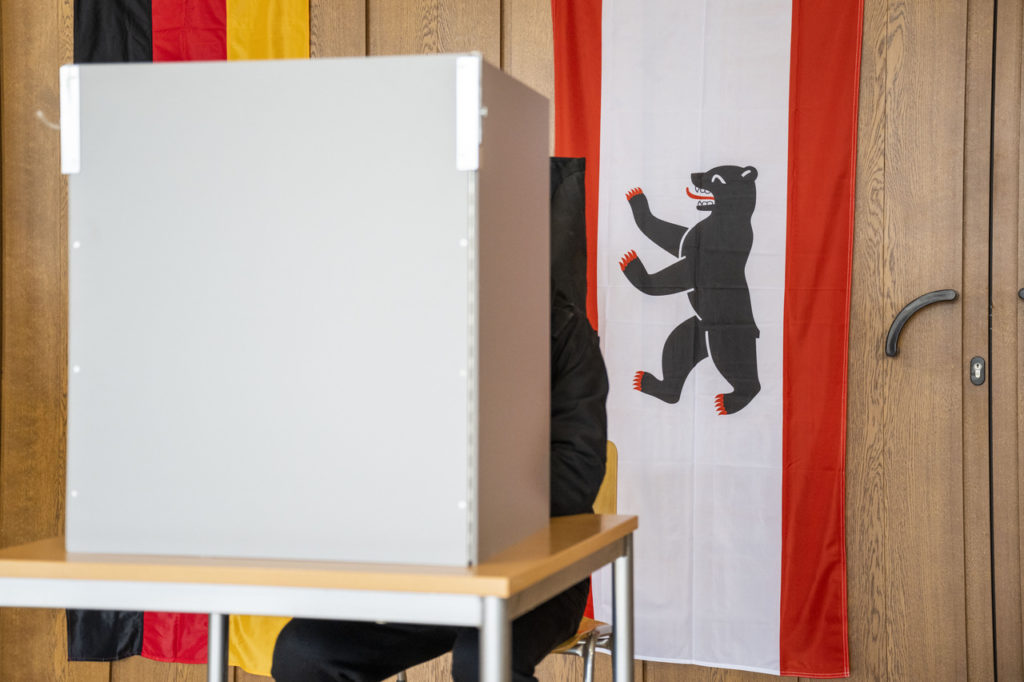EXPLAINED: Why Berlin is voting on going climate neutral by 2030

On Sunday, residents of the German capital will vote on the "Berlin 2030 Climate Neutral" referendum. Here’s what you need to know.
What is the vote about?
In the referendum on March 26th, Berliners will vote on whether or not to change the law on climate protection policy at the state level.
The citizens' initiative "Klimaneustart Berlin" wants to change the Berlin Climate Protection and Energy Transition Act, which the Senate passed in September 2021. It wants to change the law so that the goal of reaching climate neutrality would be set for 2030 instead of 2045, and to replace "climate protection targets" with binding "climate protection obligations".
They want to add two concrete emissions targets to the law: to reduce emissions in the capital by 70 percent compared to 1990 by 2025, and then by 95 percent by 2030.
To achieve this, all public buildings would need to be renovated to be climate-friendly by 2030. As this would also involve private houses being renovated and result in higher costs for tenants, Klimaneustart Berlin also wants to include relief measures in the law.
The proposal for the new law states that: "Insofar as measures or orders under this law lead to an increase in the net warm rent for housing, the amount of the increase shall be reimbursed to the payer as a monthly subsidy from the state budget."
Who is backing the vote?
The referendum was initiated by the alliance "Klimaneustart Berlin" - a civil society movement which says that it "acts as a link and platform to promote the exchange between citizens, science and politics at eye level."

Activists from Fridays for Future and other climate initiatives walk through Berlin-Mitte in February 2023. The banner reads "Berlin wants climate -but quickly". Photo: picture alliance/dpa | Fabian Sommer
Klimaneustart Berlin is supported by Vertrauensgesellschaft e.V. (the Trust Society) which tried unsuccessfully in 2022 to initiate a referendum to test a basic income in the state of Berlin. Other supporters of the alliance also belong to the left-wing and green political spectrum and include Fridays for Future, the German Bicycle Club (ADFC) and Extinction Rebellion, as well as the sustainability office of Humboldt University in Berlin.
READ ALSO: Climate group sues German government for missing targets
In an official statement on the referendum, the Berlin Senate has spoken out against amending Berlin's climate protection and energy transition law and has said it does not consider it realistic to achieve climate neutrality in Berlin as early as 2030. But there is no real campaign to say no to the referendum.
Members of the Green Party are canvassing their supporters for a "Yes" vote, while individual Social Democrats are out on the streets to get people to vote "No".
The center-right Christian Democrats (CDU), who won the Berlin state election in February, is keeping a low profile and is only encouraging its members to take part and vote no in internal communications. In public, it is only saying this cautiously, so as not to be accused of being against climate protection.
Are the goals realistic?
For Berlin to emit only five percent of the greenhouse gases it produced in 1990 would be a huge task - even Klimaneustart Berlin admits this.
The Berlin Senate, however, considers it impossible and this assessment is shared by the vast majority of experts and practitioners.
An expert report by the Institute for Ecological Economy Research (IÖW) and several partner institutions, commissioned by the Senate, believes that only a 60 percent reduction compared to 1990 levels would be achievable, as the city's energy supply - which is still at least 80 percent dependent on fossil fuels - cannot be completely converted to renewable sources in such a short time.
Lizzi Sieck, an expert on municipal climate protection at the Federal Environment Agency, told the Berliner Tagesspiegel, "Having high ambitions is absolutely right and important. But the target should be chosen in such a way that it is also achievable by the respective actor."
READ ALSO: German city residents sue government over air pollution
She pointed to the long duration of renovations, the shortage of skilled workers and exploding construction costs as factors that would make reaching the targets by 2030 very difficult.
What would happen if the referendum were successful and Berlin failed to become climate neutral by 2030?
The draft law doesn't contain any specific sanctions that would come into force if the goals and obligations which it lays out were not met.
But, in the explanatory memorandum to the law, the initiators of the referendum write that it would be up to the Berlin Senate to impose sanctions.
Stefan Zimmer, spokesman for the initiative "Klimaneustart Berlin," said that specific sanctions had not been included due to time constraints.
"Formulating such a legally effective sanction mechanism into a law is not trivial, and the lead times for the referendum are very long." Therefore, he said, the initiative decided to refer the issues to the Senate, so as not to delay the campaign for the referendum.
How likely is the vote to go through?
For the law to change, at least 615,000 voters would need to vote "Yes" on March 26th. In a poll commissioned by the alliance itself and published on its website, 46.3 percent said they would vote for early climate neutrality. 42.1 were opposed, while 11.6 percent were still undecided.

A Berlin flag hangs next to a polling booth in a polling station in Berlin at the repeated state elections in February 2023. Photo: picture alliance/dpa | Christophe Gateau
Who can vote?
Anyone who is eligible to vote in Berlin at the state level can participate in the climate referendum. That means you must have German citizenship, be at least 18 years old and be registered as living in Berlin.
According to the latest statistics from June 2022, that means around 23 percent of the adult population in Berlin will not be able to participate in the vote as they do not have German citizenship.
How can you vote?
Those that are allowed to vote, can cast their vote at their local polling station, which can be found here.
Residents can apply for a postal vote up to and including March 21st.
Comments (1)
See Also
What is the vote about?
In the referendum on March 26th, Berliners will vote on whether or not to change the law on climate protection policy at the state level.
The citizens' initiative "Klimaneustart Berlin" wants to change the Berlin Climate Protection and Energy Transition Act, which the Senate passed in September 2021. It wants to change the law so that the goal of reaching climate neutrality would be set for 2030 instead of 2045, and to replace "climate protection targets" with binding "climate protection obligations".
They want to add two concrete emissions targets to the law: to reduce emissions in the capital by 70 percent compared to 1990 by 2025, and then by 95 percent by 2030.
To achieve this, all public buildings would need to be renovated to be climate-friendly by 2030. As this would also involve private houses being renovated and result in higher costs for tenants, Klimaneustart Berlin also wants to include relief measures in the law.
The proposal for the new law states that: "Insofar as measures or orders under this law lead to an increase in the net warm rent for housing, the amount of the increase shall be reimbursed to the payer as a monthly subsidy from the state budget."
Who is backing the vote?
The referendum was initiated by the alliance "Klimaneustart Berlin" - a civil society movement which says that it "acts as a link and platform to promote the exchange between citizens, science and politics at eye level."

Klimaneustart Berlin is supported by Vertrauensgesellschaft e.V. (the Trust Society) which tried unsuccessfully in 2022 to initiate a referendum to test a basic income in the state of Berlin. Other supporters of the alliance also belong to the left-wing and green political spectrum and include Fridays for Future, the German Bicycle Club (ADFC) and Extinction Rebellion, as well as the sustainability office of Humboldt University in Berlin.
READ ALSO: Climate group sues German government for missing targets
In an official statement on the referendum, the Berlin Senate has spoken out against amending Berlin's climate protection and energy transition law and has said it does not consider it realistic to achieve climate neutrality in Berlin as early as 2030. But there is no real campaign to say no to the referendum.
Members of the Green Party are canvassing their supporters for a "Yes" vote, while individual Social Democrats are out on the streets to get people to vote "No".
The center-right Christian Democrats (CDU), who won the Berlin state election in February, is keeping a low profile and is only encouraging its members to take part and vote no in internal communications. In public, it is only saying this cautiously, so as not to be accused of being against climate protection.
Are the goals realistic?
For Berlin to emit only five percent of the greenhouse gases it produced in 1990 would be a huge task - even Klimaneustart Berlin admits this.
The Berlin Senate, however, considers it impossible and this assessment is shared by the vast majority of experts and practitioners.
An expert report by the Institute for Ecological Economy Research (IÖW) and several partner institutions, commissioned by the Senate, believes that only a 60 percent reduction compared to 1990 levels would be achievable, as the city's energy supply - which is still at least 80 percent dependent on fossil fuels - cannot be completely converted to renewable sources in such a short time.
Lizzi Sieck, an expert on municipal climate protection at the Federal Environment Agency, told the Berliner Tagesspiegel, "Having high ambitions is absolutely right and important. But the target should be chosen in such a way that it is also achievable by the respective actor."
READ ALSO: German city residents sue government over air pollution
She pointed to the long duration of renovations, the shortage of skilled workers and exploding construction costs as factors that would make reaching the targets by 2030 very difficult.
What would happen if the referendum were successful and Berlin failed to become climate neutral by 2030?
The draft law doesn't contain any specific sanctions that would come into force if the goals and obligations which it lays out were not met.
But, in the explanatory memorandum to the law, the initiators of the referendum write that it would be up to the Berlin Senate to impose sanctions.
Stefan Zimmer, spokesman for the initiative "Klimaneustart Berlin," said that specific sanctions had not been included due to time constraints.
"Formulating such a legally effective sanction mechanism into a law is not trivial, and the lead times for the referendum are very long." Therefore, he said, the initiative decided to refer the issues to the Senate, so as not to delay the campaign for the referendum.
How likely is the vote to go through?
For the law to change, at least 615,000 voters would need to vote "Yes" on March 26th. In a poll commissioned by the alliance itself and published on its website, 46.3 percent said they would vote for early climate neutrality. 42.1 were opposed, while 11.6 percent were still undecided.

Who can vote?
Anyone who is eligible to vote in Berlin at the state level can participate in the climate referendum. That means you must have German citizenship, be at least 18 years old and be registered as living in Berlin.
According to the latest statistics from June 2022, that means around 23 percent of the adult population in Berlin will not be able to participate in the vote as they do not have German citizenship.
How can you vote?
Those that are allowed to vote, can cast their vote at their local polling station, which can be found here.
Residents can apply for a postal vote up to and including March 21st.
Join the conversation in our comments section below. Share your own views and experience and if you have a question or suggestion for our journalists then email us at [email protected].
Please keep comments civil, constructive and on topic – and make sure to read our terms of use before getting involved.
Please log in here to leave a comment.